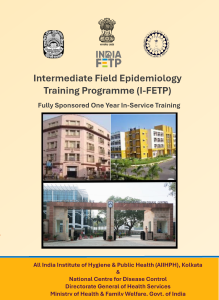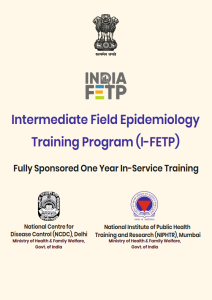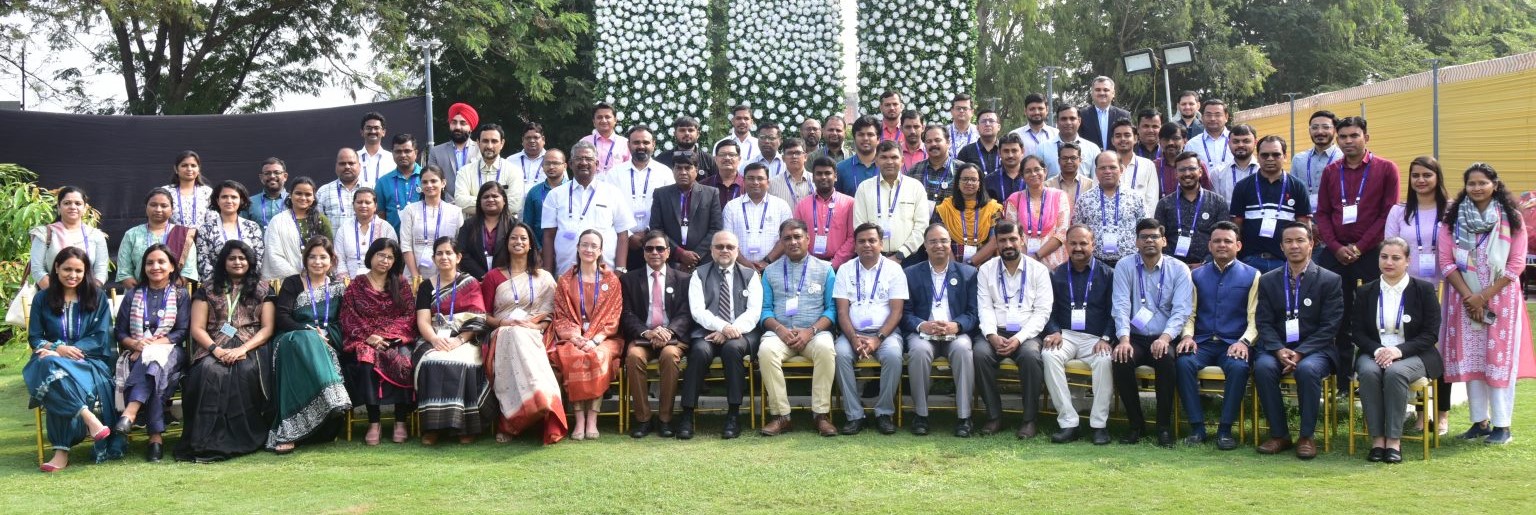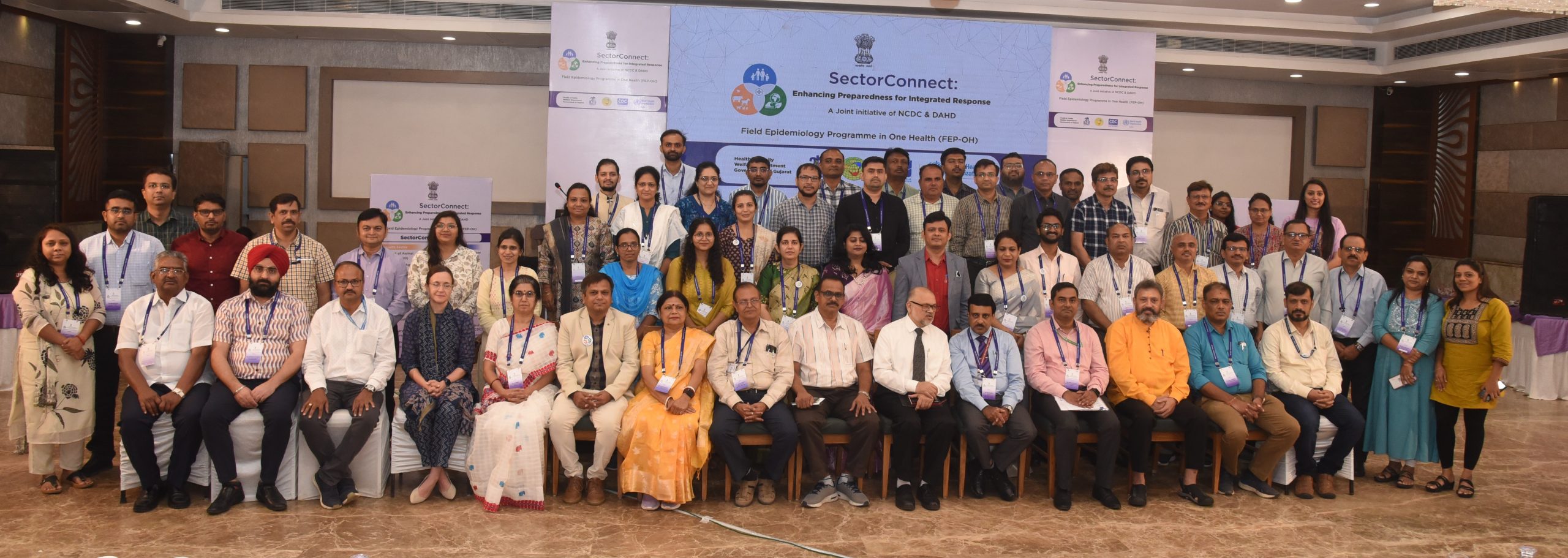India Epidemic Intelligence Service Programme
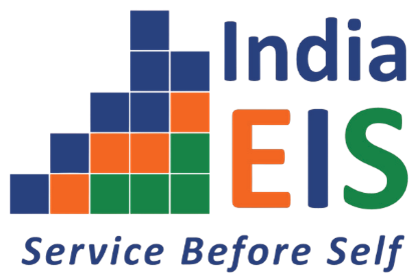
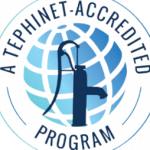

‘One India’ FETP (Field Epidemiology Training Programme) roadmap is an initiative to consolidate the efforts of different government agencies to scale up the field epidemiology training in the country and provides strategic direction for achieving the target of field epidemiology training coverage to all the districts of India in 2030. This roadmap document was launched in February 2023 during FETPICON-2023 at Varanasi by the Minister of State for Health and Family Welfare, Government of India.
India EIS Programme

EIS officer collecting rodent sample during Scrub Typhus outbreak investigation, Sundargarh district, Odisha, October 2023

EIS officer interacting with a community member during a diarrheal disease outbreak investigation, Sonbhadra district, Uttar Pradesh, August 2023
The India Epidemic Intelligence Service (EIS) Programme is a 2-years applied epidemiology training run by the NCDC, Delhi. The programme is modelled after the EIS program at the US Centers for Disease Control and Prevention (CDC) and is implemented in technical collaboration with US CDC.
Participants are trained to develop public health skills while working with various public health agencies/programmes in the country. The state and central public health agencies forward the applications of their employees and if selected, they are deputed to NCDC for 2 years. Individual candidates with public health experience can also apply. Selection is through a highly competitive process by a committee of experts. The cost of training is borne by NCDC.
Master in Applied Epidemiology (MAE)
Participants in the India EIS training programme now have the opportunity to earn a Master in Applied Epidemiology (MAE) degree from the H.N.B. Medical Education University, Uttarakhand. The Master programme is integrated with the India EIS training. The participants will have to clear examinations conducted by the University from time to time and fulfil other requirements laid down by the University to earn the degree.
About TEPHINET Accreditation

Intermediate Field Epidemiology Training Programme (AIIH&PH, Kolkata)
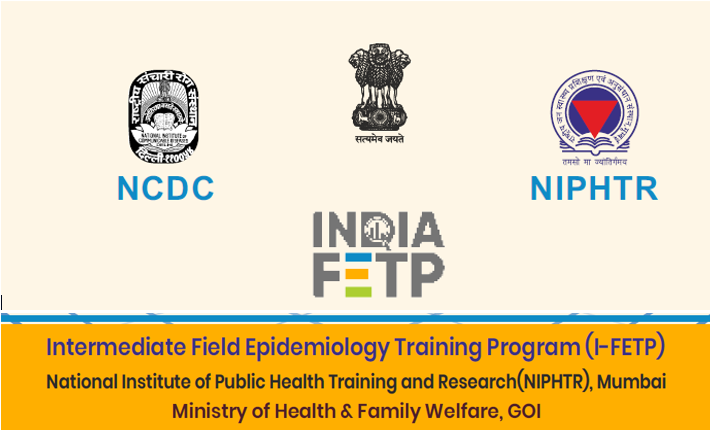
Intermediate-Field Epidemiology Training Programme (NIPHTR, Mumbai)
Field Epidemiology Programme in One Health- SectorConnect
SectorConnect: Enhancing Preparedness for Integrated Response Field Epidemiology Programme in One Health (FEP OH)
SectorConnect FEP OH is a 3-month on-the-job multi-sectoral capacity-building program for professionals from human health, animal husbandry, wildlife, food safety, and points of entry, etc. at the district level using the One Health approach.
The primary goal of this initiative is to strengthen the system’s capacity to respond to public health threats through a multisectoral collaborative approach, enhanced intersectoral coordination, cross-leaning, and effective communication. It aims to enhance integrated response through surveillance data analysis & information sharing, and joint outbreak investigation using One Health approach at the field level.
The 3 months are divided into contact session period (10%) and field interval (90%). There are a total of three contact sessions (one contact session per month, and each session is of three days), which are conducted at a venue within the state. Between each contact session is field interval of one month (two field intervals), wherein the trainee officers, while at their duty stations, complete their field assignments under the mentorship of medical and veterinary college faculty. These sessions cover a broad spectrum of topics, including epidemiology, One Health, disease surveillance, joint outbreak investigation, biosafety and biosecurity, risk assessment, risk communication, community engagement, WASH (water, sanitation, and hygiene), vaccination, international health regulations (IHR), IHR-PVS (Performance of Veterinary Services), and stakeholder analysis. During the contact session, officers also participate in case studies, group exercises and interactive quizzes designed on application of one health approach in local context.
The pilot batch of SectorConnect FEP OH has been successfully completed across nine districts under the Narmada Division of Gujarat State, spanning from December 2023 to February 2024. To mark the paradigm shift that SectorConnect represents, the brand color of the training is “Purple” – the color seen during dawn, marking a time of change. SectorConnect is the dawn of a new era in collaborative preparedness, laying the groundwork for a safer and healthier future for all.
NCDC in collaboration with DAHD completed the training of second batch of SectorConnect Field Epidemiology Programme in One Health (FEPOH) at Ahmedabad, Gujarat on 12 July 2024. The valedictory session was graced by DGHS Prof (Dr) Atul Goel, Assistant commissioner Animal husbandry and dairying Dr Adhiraj Mishra, Director AIIHPH Dr Ranjan Das, Assistant director Public Health Gujarat Dr R B Patel, State surveillance Officer Gujarat Dr Jayesh Katira, Deputy Director Animal Husbandry Gujarat Dr Amit Kanani, Assistant Director (Technical) FSSAI Gujarat, Resident Advisor FETP CDC, India Dr Kristin VanderEnde among others. From the concluding batch two teams Vadodara and Amreli received best presentation award for their outbreak investigations from Prof (Dr) Atul Goel. In all 35 participants representing human health and animal health from 6 districts, 2 municipal corporations and 1 APHO completed the training under the mentorship of 7 mentors from medical and veterinary colleges.Regional Field Epidemiology Training Programme (FETP)
NICD has been designated as the WHO Collaborating Centre for Epidemiology and Training in 1996. A 3-month course in field epidemiology was started in 1996. Since then, one course is being organized every year. This is one of the prestigious courses of the South East Asia Region (SEAR) for medical officers working in the field of public health.
The objective of the course is to strengthen the technical capabilities and skills of health personnel by providing practical training in the field of epidemiology, management of health programmes and usage of computer. At the end of training programme, the participants are expected to:
The methodology of conducting FETP includes lectures, technical discussions, modular exercises, visits to institutions, and field exercises. A review of the course was jointly undertaken by NICD, WHO-SEARO, and experts from Thailand, Indonesia, and Bangladesh in 2006-2007. These experts with the help of their colleagues developed a set of ten standard training modules which have since been used for the training.
- Detect epidemic through early warning signals.
- Conduct epidemic investigations/field surveys.
- Institute appropriate & timely response for prevention & control of outbreaks, health impacts of disasters & environmental health issues.
- Collect appropriate laboratory specimens, learn techniques related to storage & transportation of the specimens to the laboratory.
- Provide leadership in control of endemic & epidemic-prone diseases.
- Design, implement & evaluate disease surveillance systems.
- Evaluate disease control/ prevention measures.
- Conduct epidemiological & statistical analysis of complex data sets.
- Use computers effectively for data management, graphics and presentation and use of EPI INFO.
- Build effective communications skills in public health.
- Prepare, present/publish technical reports / articles.
- Remain prepared for any public health emergencies.
- Train other health professionals.
The initial five-week classroom sessions of the training covers concept of field epidemiology, epidemiological tools, bio-statistical applications, principles of outbreak investigations, disease surveillance and management of disease control programs. The faculty of the course include senior officers of NICD, other premier institutions in Delhi, Directorate General of Health Services and the regional and country office of WHO.
This classroom training is followed by 6 weeks field visits that include community-based survey including data collection, compilation, analysis, report writing and preliminary presentation; institutional data analysis, outbreak investigation and study of surveillance system at district level . Field exercises are conducted in collaboration with the regional branches of the NICD. During the field posting the participants are placed in a group of 4-5 at one of the NICD branches under the direct supervision of officer-in-charge of the branch. Faculty members from NICD, Delhi and WHO, periodically visit these branches to provide support and technical supervision to the participants in their field projects.
The remaining time is utilized for finalization of reports and preparation for presentation of the field studies and post-training evaluation of the participants.
In the year 2008-09, the training programme was carried out during 12th August- 11th November 2008 in which 13 participants from India, Maldives, Bhutan, Nepal & Sri Lanka attended the training programme.
Two-week Field Epidemiology Training Programme (FETP)
There are variations in existing capacities for surveillance and response in various countries of the World Health Organization-South East Asian Region (WHO-SEAR). However, in all these countries there is a need to strengthen core-capacities required for implementation International Health Regulations (2005) at various levels.
From experience, it was observed that it is not feasible for some countries of WHO-SEAR to dedicate time for medical officers to train in either the two-year or the three-month FETPs. Cognizant of this challenge, and based on lessons from other courses NICD with the support of WHO have reviewed and adapted a two-week competency-based training course. This course aims to develop essential skills of peripheral health workers in basic disease surveillance, epidemic preparedness and outbreak management. This course is an important step to accelerate the process of developing human capacity for successful implementation of IHR (2005) and enhance preparedness for management of outbreaks and epidemics.
The overall objective of the course is to strengthen the skills of peripheral health professionals/personnel in basic epidemiology and its application in disease surveillance and response. The faculty for this course includes apart from others, professionals who have earlier been trained in 3 months FETP course.
The training program broadly covers topics on basic epidemiology, disease surveillance, epidemic preparedness, outbreak investigation and response, designing field based studies, carrying out field-exercise, field exercises/surveys and institutional data analysis and report writing. The course contents are modified as per the needs and specific context of the country organizing the course.
The learning methodology includes one-week class-room learning and one-week field-assignment. In general it employs lecture-cum-discussions, group work and presentations, field exercises, i.e. “learning-by-doing”; and report writing and plenary presentation of field-work
The monitoring and evaluation of the course is carried out using pre- and post-training assessment tests. The feedback is utilized to further improve the tools and methodology. The course is being revised continuously based on lessons and feedback from the field.
Regional Training Programme on Prevention and Control of Communicable Diseases for paramedics
The paramedical health personnel are key pillars of public health services and play crucial part in the early detection of outbreaks in the community. To manage and control infectious and preventable diseases and achieve better quality surveillance data, effective strategic measures are needed to enhance the skills of not only medical personnel but also of paramedical personnel. Various training programs to train medical personnel have been set up in different countries but there was scarcity of the training programmes for the paramedical personnel.
Recognising this need the National Institute of Communicable Diseases started a four weeks “Regional Training Programme on Prevention & Control of Communicable Diseases” for the paramedical health personnel of South East Asia Region in 1999. This is a tailor-made training programme for participants from countries of South East Asia Region to strengthen their epidemiological skills. The course is organized once a year. So far, a total of 150 participants from Bhutan, Maldives, Myanmar, Nepal, Sri Lanka and India have been trained at the NICD.
The objective of the course is to strengthen the technical capabilities and skills of paramedical personnel by providing practical training in prevention & control of communicable diseases and application of computer for surveillance purposes.
The course is of four-week duration with focus on field project and practical demonstration. The methodology of the course includes lectures, technical discussions, modular exercises, demonstration, visits to institutions and field exercises. Basic skills for use of computers for surveillance are also provided.
The training program broadly covers topics on basic epidemiology, basic statistics, disease surveillance, epidemic preparedness, outbreak investigation and response, designing field based studies, carrying out field-exercise, field exercises/surveys and report writing and its presentation.
The monitoring and evaluation of the course is carried out using pre- and post-training assessment tests. The feedback is utilized to further improve the course










